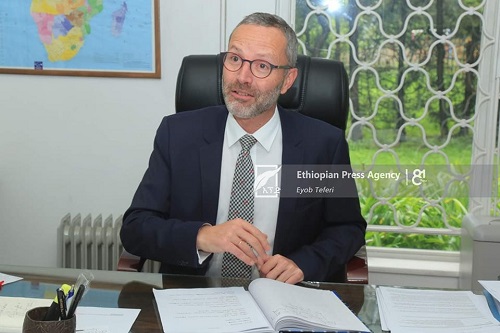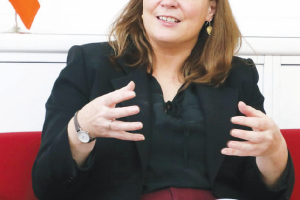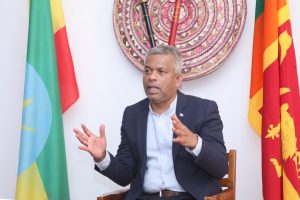
BY GIRMACHEW GASHAW
Today’s guest Rémi Maréchaux, is France Ambassador to Ethiopia. Prior to his assignment to Ethiopia, he served with the same position in Kenya and Somalia. He was also Director General for Africa under the French Ministry of Foreign Affairs.
“I am very glad to be here in Ethiopia, as it is the political capital of Africa and it was very logical for me to exist here at this juncture after having worked 30 years in Africa to be finally posted in Addis.”
The ambassador studied political science at the Political Science Institute of Paris. He then studied two major African languages, Kiswahili and Arabic.
The Ethiopian Herald made a short stay with Rémi Maréchaux in connection with the 125th Anniversary of diplomatic relations between Ethiopia and France that has been celebrated recently. The ambassador touched some points concerning the socioeconomic development of the two countries.
First of all, thank you very much Ambassador for your willingness and cooperation to make this interview possible. Now, the 125th anniversary of the diplomatic relations of Ethiopia and France has been celebrated. Tell us briefly the major achievements so far in this regard.
Okay. First of all, I want to say something on the importance of this anniversary. Ethiopia and France have the oldest political relation in Africa. There is no other country in Africa with which we have established diplomatic relation 125 years ago. When you establish diplomatic relation, the most important thing is, you recognize the partner as independent and sovereign. In short, we have historic relation and even the oldest embassy in Africa shows the matured tie between the two nations. The Ethio-French alliance is the oldest on the continent.
The important point we want to underline is, we have a unique relation with Ethiopia. We celebrate the past to better build on the past and to agree on a common project for the future. So, we have decided to celebrate one aspect of the relation each month for the full year. So we have started by the French language as there are many French words in Amharic even if you can’t understand it.
We then celebrate the dedication and elegant partnership we have with not only the Lycee Gebre Mariam School but also other Ethiopian universities. We have celebrated music concert organized at Hager Fiker Theater. We also celebrated architecture recently. Even last week, there was a screening of a documentary on the Addis Ababa architecture and the role of French architect in modernizing the city. And now we continue working on the next very important phase will be archaeology. So we will have the opening of the Lalibela 3D exposition in Entoto Park in September. So, we continue each and every month to celebrate one aspect of the bilateral relation in order to build on this common achievement for a common good of our future.
Recently, a French investment of first of its kind malt factory comes into oppression in Addis Ababa especially at Bole Lemi Industrial Park, how suitable is Ethiopia for investment in your view?
Ethiopia is very much suitable for investment but still there are many problems to be solved. So, this investment is a good example of how a French company can fit with the Ethiopian government’s strategy. With regard to the malt factory, the strategy of the Ethiopian government is very well known, it is import substitution.
So, the investment of Soufflé, which is 60 million Euro, as a twin investment of another French company may be a competitor or a partner, which is Boort Malt, exactly the same factory in Debre Berhan, with a vision of producing malt in Ethiopia rather than importing it. Thus, the strategy of the government is clear. There is even a tax incentive for the Brewers to buy locally produced malt instead of importing. So, Ethiopia is very suitable for investment.
But to be very candid with you, the two companies also are confronted with a problem that all Ethiopians know very well which is access to foreign currency when you need to import spare parts or some element key component of the factory. So, after several years of activity, the company might want to send the benefit back. Foreign currency is still a problem not only for French companies, but also all the foreign companies including all Ethiopians.
I wish to underline that this investment is very important but we have others even bigger investment such as the Meridiam Tulu Moye project, which is several 100 million dollars of investment to increase the production of electricity especially renewable electricity in Ethiopia. So to be precise, we are fully aware that the potential of the Ethiopian economy is huge, it may be one of the largest in Africa but there is still problem to be fixed in order to attract more investors.
Maybe to add more in the first point, do you think that friendship multinationals, soufflé malt, for instance, would stand as a sign that more investors would prefer Ethiopia to invest?
You are right, that’s very important to have a major group investing, because when a potential investor is scouting for opportunity, it will come and meet the embassy and the Ethiopian authorities but what would be the most convincing proof would be the testimony of a previous investor to explain what the problem, how did they succeed? And so when you have a major multinational, like soufflé investing in Ethiopia, it is a very good sign for other potential investors.
In May of this year, agreement amounting to 19 million Euros was signed for capacity building and heritage site conservation and valorization. How soon would it be practical?
Okay. The 19 million Euros is adding two different projects. One is, an agreement signed with Ethiopian electric power (EEP) to create a training center. That is one important point. The rest was for the transformation of the National Palace into a museum. So basically, we have two major heritage projects in Ethiopia. The first one is the Lalibela churches preservation and restoration which is going on. The second one is the transformation of the National Palace into museum. So, the work has started. If you go nearby you can see workers very active. And it is a very huge project
having a vision of turned into a museum. Presently, the civil work has already been started. Parallel to that, capacity building training is also given for some curators to organize and manage the museum.
And for these, we have mobilized the capacity of one of the most well known Museum in France, which is the Versailles Palace to provide some assistance, transfer of skills of expertise in order for this new museum to be able to offer Ethiopia a glimpse of their history but also to provide foreigners an opportunity to stay more in Addis and visit since the whole point of our two heritage project is not only to preserve heritage but also to increase the tourist inflow and to create jobs.
I want to raise some points related to this issue. How would you monitor and evaluate the outcome of the support of each sector?
For each and every project that we support in Ethiopia, we have established a steering committee together with the Ethiopian authorities and with regular report on the impact on the way the project is implemented. Finally, we explore impact assessment of each and every project especially when it is completed.
Among the agreements, one on defense cooperation, seems to have been overlooked. Why is that?
The agreement is still there. This is the implementation of military cooperation which has been suspended. So we hope it will be able to resume as fast as possible following the progress that are made in Ethiopia regarding peaceful and political solution to the conflict in the north.
So the reason for the suspension of this military cooperation activity was directly linked to the human rights violation that happened during the conflict were documented by the Ethiopian Human Rights Commission for which the Ethiopia government has taken very strong commitment to follow up the conclusion of the report and to bring justice for the victims. Thus, we have seen progress. We are in constant touch with the Minister of Justice. We monitor what is going on to see the progress and perspective of the political dialogue to bring a solution. We hope that we will be able to resume activities especially cooperation for the recreation of Ethiopian Navy as soon as possible.
Ethiopia is in the process to conduct inclusive national dialogue to bring about lasting peace in the country. The government has also taken practical steps to hold peace talks to end conflict. What is your take on that?
My take is, it is very good news. I mean, my government officially saluted this move. Since the beginning of the conflict, we did not issue many statements other than we directly discussed with Ethiopian counterpart. Since the very beginning of the conflict, we shared our assessment that the conflict could only have one loser and that would be Ethiopia itself. That war goes with too many suffering for too many Ethiopians in many regions. The only credible way to bring back peace was a political settlement.
So, the decision taken by the government to stop the offensive, to decide the humanitarian truce, to release some prisoners, to put in place the national dialogue commission and then more recently to create a team for the negotiation to come are very good news. Because we think with our own experience, the experience we have of crises elsewhere that only a political solution could bring lasting peace.
Ethiopia is toiling to bring not only development for its people, but also to benefit its neighbors and beyond. The GERD can be one among these. But disinformation seems to set challenge to Ethiopia. How do you think this is tackled?
First of all, the development of new electrical production capacity is key for the development of the country. There are a large number of people in Ethiopia without access to electricity. And all the projects that have been launched by the government such as the industrial park need more electricity. Thus, it is very important to increase the capacity of electricity especially in the renewable energy. That is one reason why French investment currently in Ethiopia is focusing to develop the geothermal electricity production. Hence, there is no question for us about the usefulness of additional electrical production capacity.
Regarding the GERD, the Nile should be a link between all riparian states and should not be an object of dispute. There are many examples elsewhere in the world that support the above fact. The oldest international organization was created to manage jointly the Rhine River in Europe, so that was France, Germany, Netherlands and Belgium. That was 1815. The other example in Africa is the Senegal River. It is understandable that all riparian states have to be informed about the project that might be directly or indirectly affects them. So, in that case, at least the three major stakeholders, i.e, Ethiopia, Sudan and Egypt renew talks with the mediation of the African Union to find a common understanding.
Per the homegrown economic program, projects are coming to fruition in Addis Ababa and elsewhere in the country, what is your impression about these projects? For instance, the destination Developments ?
There are two aspects in your question. Regarding the homegrown economic reform project, it’s a project that we are fully supporting. The French development agency and high level expertise from France are supporting the project. We have experts working together with FDRE Ministry of Finance to improve the management of state owned companies.
There are several aspects of this ongoing economic program which deserve to be supported. That is why we support them through mobilizing expertise and finance. For the rest, I make a link with what we just said regarding the heritage project. So it is important that Ethiopia should better develop its tourist capacity. Tourism is very important sector in France as our country is the first tourists’ destination in the world. We benefit a lot economically and it leads to massive job creation.
This is not yet the case of Ethiopia as the potential of this country is not fully used. Thus, any project that would create more reason for tourists to stay longer in Addis before visiting the historical sites are a project to be supported as they’re going to benefit to the all Ethiopian population.
Finally, what would you like to say about Ethiopia’s role being paid for dignity, peace and development of Africa?
As I said earlier, Addis Ababa is hosting the African Union Commission which is very imperative. We all know the reason why Addis Ababa was chosen to be the seat of African Union (AU); it is due to the history it has. That is one.
The other significant point is, we recognize the Ethiopian contribution to peace and security in the region through the participation of Ethiopian soldiers in peacekeeping operation.
Concerning the Pan African movement and the building of Pan African integration, the most important is to work on concrete project. I said this taking our own experience in the European Union. Europe was one of the continents the most struck by war in the past century and we decided to put together our national interest to go beyond the national interest to build a common interest. Thus, this is what we did through economic integration. And now the institution of the European Union provided the longest period of peace and prosperity that it ever experienced.
So, it is important to work concretely with the African integration especially through the Africa Continental Free Trade Area. This is a key element.
If you look at the current consequences of the war between Russian and Ukraine which is increasing the price of cereal, fertilizer and so on, if Africa adds an integrated continental market, most of the problem could be tackled as it will be easier to import grain, fertilizer and so on from one part of Africa to the other. So the ultimate goal of African Unity is something we can only support as we have experienced this in Euro. We have experienced in our daily life and it would bring countless benefit to all citizens.
I have finished all my questions. I would like to give you a chance if you want to add any more points.
As of Thursday, we are celebrating a
national day which is the Bastille Day. I want to say something for Ethiopians who do not know what it means. The day is not our president birthday, not an Independence Day, not a Constitution Day. We are celebrating a revolution. 233 years ago, the people of France marched against the arbitrary-it is called Bastille Day as Bastille used to be a prison in where the king used to jail anyone.
So, there were no judges involved. So, arbitrary action was carried out during the authoritarian regime. People took to the streets to change the system and this is a sign we see it as the resistance to the arbitrary rule, the aspiration for anybody to be able to benefit from respect of human rights which is shared by everybody.
This is what we think. This is what we see on the African continent. If you just go to your neighbor, Sudan. The 2019 revolution is something that was purely Sudanese and they took the streets to put an end to dictatorship as they wanted to enjoy human rights. They wanted to benefit from human rights and democracy. So this is still our own DNA because of our revolution. Celebrating a revolution is also recalling the aspiration of the French citizens for more than two centuries to benefit and to promote human rights and democracy.
Thank you for your time and willingness.
Thank you so much
The Ethiopian Herald July 16/2022




